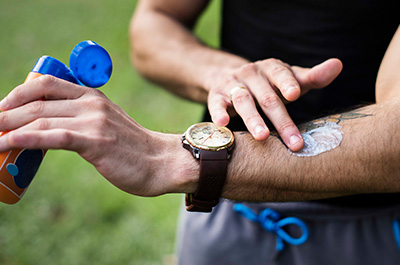According to the American Association of Dermatology, there is no safe level of sun exposure. The more time you spend in the sun, the greater your risk for skin cancer and premature skin aging.
But that doesn’t mean you can’t enjoy your favorite outdoor activities. A daily skin protection routine can keep your whole family safe in the sun.
“Make sun protection a family affair. Create a fun, daily routine for healthy habits that will last a lifetime,” says Allison Zarbo, M.D., a pediatric dermatologist at Henry Ford Health.
Daily Sun Protection Habits
We get more sun exposure than we think—the risk doesn’t just come from being outside on sunny days. Unexpected sources of sun exposure are all around us. Going outside on a cloudy day or even standing inside next to a window can contribute to your risk of skin cancer.
But with simple strategies, you can protect yourself and your family. Dr. Zarbo recommends making these steps a daily habit:
- Seek shade during peak sunlight: Avoid or limit sun exposure from 10 a.m. to 2 p.m. when the sun’s ultraviolet rays are highest.
- Wear protective clothing and eyewear: Broad-brimmed hats and clothing with built-in sun protection factor (SPF) protect your skin. Long-term sun exposure can also damage your eyes, increasing the risk of cataracts, macular degeneration and eye cancer. Choose sunglasses that offer 100% ultraviolet (UV) protection (labeled UV absorption up to 400mn).
- Apply sunscreen throughout the day: Sun protection only works if you use it correctly. Choose a broad-spectrum sunscreen that protects against UVA and UVB rays with SPF 30 or higher. Apply sunscreen 30 minutes before heading outside and reapply every two hours.
- Choose a sunscreen to fit your skin type: Sunscreens use either physical or chemical blockers to protect your skin from the sun. Physical-blocking agents like zinc oxide and titanium dioxide are gentler on sensitive skin. But these agents can leave a thin layer of white film behind. Chemical-based sunscreens go on clear, with no residue.
- Avoid sunscreens that contain bug repellant: Insect repellants contain chemicals that could be harmful if reapplied during the day. If you’re heading into a wooded area, apply sunscreen first and then bug spray. Only reapply sunscreen every two hours.
- Make sun protection fun for kids: Let your kids use a makeup brush to apply sunscreen lotion on themselves. Sing a song or name the body parts so they learn to apply sunscreen on all exposed skin areas. Choose a favorite color or pattern for protective clothing to add extra sun protection for kids.
- Get vitamin D from food, not the sun: Sunlight is a good source of vitamin D, which is essential for healthy bones. But you can also get vitamin D through your diet with foods like fatty fish and eggs. Many dairy products and cereals also contain vitamin D.
What To Do If You Get A Sunburn

Sunburns can still occur, especially if you spend more time outside than planned. To relieve pain and redness from a mild sunburn, Dr. Zarbo recommends:
- Getting out of the sun
- Taking an over-the-counter pain reliever
- Applying moisturizer and 1% hydrocortisone ointment
- Trying a cool or lukewarm bath
If you have a severe sunburn with blistering, don't pop the blisters. Clean your skin with mild soap and water and cover loosely with gauze. Contact your doctor to ensure you heal safely and avoid infection.
“Many people underestimate how quickly the sun can cause skin damage. To protect yourself and your family, stick to sun protection habits that allow you to enjoy the outdoors safely,” says Dr. Zarbo.
Reviewed by Dr. Allison Zarbo, a pediatric dermatologist who sees patients at Henry Ford Medical Centers in West Bloomfield, Dearborn and Detroit.



